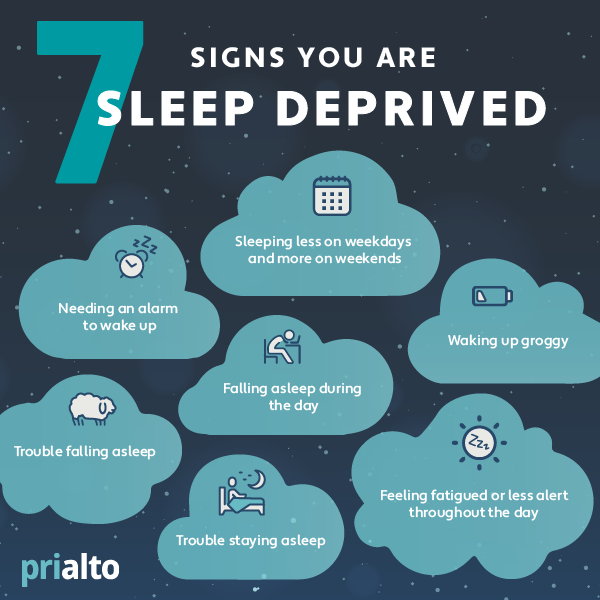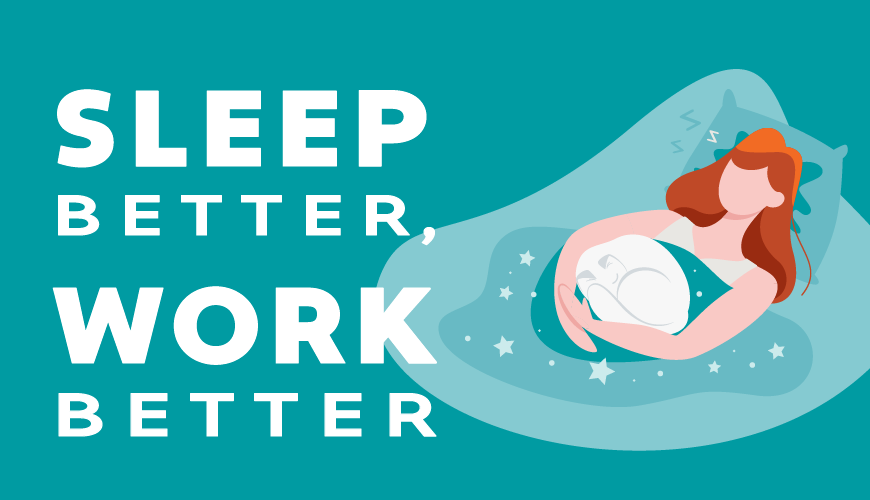Prialto’s 2021 Executive Productivity Report uncovered a shocking statistic.
71% of the 600 high-earning executives who were surveyed reported getting less than 6 hours of sleep a night.
It’s understandable.
High-earning jobs are high-stakes jobs, and there are only 24 hours in a day.
Performance pressure can feel as threatening as a tsunami, and you need to make sure everything that needs to get done, gets done on time.
But you’re human.
You have needs outside of work that compete for your time, too.
Family, exercise, hobbies, and much-needed downtime, —all of these are important contributors to success.
Reducing sleep might seem like the obvious solution, but when you do, you’re trading quality for quantity, and it’ll cost you in the long run.
The truth is that you’re not “doing nothing” while you’re asleep.
Sleep is not indulgent, nor is it an expression of laziness.
You aren’t stronger because you sleep less.
In fact, just the opposite.
Because the hours you spend sleeping are when your mind and body do some of their most important work.
So, it’s not just time in bed that you’re cutting down on when you don’t sleep enough.
You’re also reducing your:
- Productivity
- Resilience
- Attention to detail
- Motivation
- Decision-making ability
- Memory and learning capacity
- Attention span & focus
- Empathy
- Body’s ability to heal itself
All of which are essential for effective leadership and positive results in your business.
Meanwhile, you’re increasing your risk of:
- Chronic stress
- Depression, anxiety, and mood disorders
- Accidents and injuries
- Burnout
- Cardiovascular and other diseases
- Death (Yes. It’s that serious.)
And if that doesn’t inspire you to go to bed earlier, maybe this will:
Less sleep also means less dollars in your pocket.
A 2010 study published in the Journal of Occupational and Environmental Medicine calculated that sleep-related productivity loss costs about $3,156 per employee annually.
And an international 2016 study published by the RAND Corporation showed that up to 3% of GDP is lost due to a lack of sleep, with the US topping the losses at $411 billion annually.
Now, it is true that a few lucky individuals are genetically predisposed to need less sleep.
And everyone who sleeps less than 7 hours a night claims to be one of these people.
But according to the University of California neuroscientist, Matt Walker, “short sleepers,” as they’re called, make up zero percent of the population when the fraction is rounded to a whole number.
You’re more likely to be struck by lightning than you are to have these genes.
“Short sleepers” are characterized as being full of energy and consistently sleeping about 6.25 hours, even when there is more time available to sleep.
They don’t need coffee to keep them alert.
Instead, they fall asleep easily, sleep deeply, and wake up refreshed, with no sign of grogginess or mental impairment in their waking hours.
To be clear, 6.25 hours is still more sleep than 1/3 of Americans are getting on average per night.
And these are people who don’t have the “short sleeper” genetic variation.
Which means there are huge swaths of the workforce who are operating at suboptimal levels thanks to sleep deprivation.
If you've skimped on sleep or suffered from insomnia for a few years, you probably don’t realize what an impact it’s having on you.
Just like a drunk person who thinks they’re sober, your fatigue is clouding your ability to see your impairment clearly.
“It is one of the big dangers with sleep is that you don’t know you’re sleep deprived when you’re sleep deprived.”
-Matt Walker
The vast majority of people who get less than 7 hours of sleep are, in fact, chronically sleep deprived, and it’s having a significant negative impact on their lives and work.
Signs that you are sleep deprived include:
- Sleeping less on workdays but more on weekends and vacations
- Needing an alarm to wake up
- Waking up groggy
- Feeling fatigued, foggy-brained, and less mentally alert throughout the day
- Trouble falling asleep
- Trouble staying asleep
- Falling asleep during the day
If you experience any of these signs, there’s no doubt about it.
You need more sleep.
And for the sake of your work, health, and well-being, it’s essential that you take steps to improve both the duration of your sleep as well as the quality.

Here are 5 strategies you can use to sleep better:
Once you start sleeping better, you won’t just get more done.
You’ll feel happier and less stressed, too.
As a result, the work you do will be higher quality, you’ll be more efficient, and you’ll boost your productivity exponentially.
1. Stick to a schedule
A consistent sleep schedule is one of the best ways to optimize your time in bed.
Sleep hormones are cyclical, and they thrive on predictability.
When you go to bed and wake up at the same time every day, you fall asleep faster, sleep deeper, and wake up more refreshed.
Don’t stray from your schedule by more than an hour — even on weekends! — and you’re setting yourself up for deep sleep success.
This is as close as you can get to the efficiency of biological short sleepers.
A predictable sleep routine also sets the foundation for a more efficient work routine.
When you have a consistent sleep routine, your energy peaks and descends predictably throughout the day as well.
This means you can schedule your most intense work when you know you’ll have the energy to do it.
And you can schedule less focused work when you know your energy will dip.
If you’re more introverted, for example, you can use this information to schedule meetings when your energy is high.
If you tend toward extroversion, you might want to schedule meetings when your energy is lower so you can feed off other people.
2. Identify your sleep needs
Most people thrive on 7-9 hours of sleep per night, but individual needs vary.
Would you wake up at the same time if you didn’t set an alarm?
If the answer is “no,” your body is sending you a clear signal that it needs more sleep.
And if you aren’t sure how much sleep you need, start by scheduling 8.5 hours in bed and notice if you still need that alarm after a week or two.
Why 8.5 hours?
Because most people need about 30 minutes to fall asleep after laying their head on their pillow.
But if you want to fall asleep faster, you can speed this process up with a wind-down routine.
3. Create a wind-down routine
A wind-down routine primes your mind and body for better sleep.
Ideally, you want to dedicate 15-30 minutes to your wind-down routine before bed.
Do something relaxing, like meditation, gentle yoga, or a warm Epsom salt bath.
This will help your mind let go of your to-do list, and turn on your parasympathetic nervous system so you fall asleep faster.
4. Optimize your sleep environment
Set yourself up for better sleep by optimizing your sleep environment.
Sleep psychologist Michelle Drerup, PsyD, of the Clevland Clinic, says to keep your bedroom at 60 to 67° F (15 to 19° C) and to think of your bedroom as your ‘cave.’
“It should be cool, dark and quiet to enhance your sleep,” she explains.
Blackout curtains and earplugs can help.
Finding your ideal bedroom temperature is also essential for better sleep and productivity.
Thermoregulation keeps you in the restorative, slow-wave sleep stages that your mind and body need in order to feel rested.
And this can boost performance throughout the day.
But a cool, dark, and quiet environment is important in the hour or two before you lay down, too.
Too much light exposure can inhibit the release of your body’s sleep hormone, melatonin, so it can be helpful to turn off overhead lighting after sundown, limit screen time before bed, and remove electronics from the bedroom to support better sleep.
5. Delegate
Of course, insomnia might not be your problem.
You probably aren’t getting enough sleep because you simply have too much to do.
You might feel like there just aren’t enough hours in the day, when really there are.
It’s just that busywork like administrative tasks and scheduling are stealing time from the work that’s important to you.
Sleep is nonnegotiable.
And if you don’t have enough time for it, it’s a sign of inefficiency, which can be fixed.
If your work obligations are preventing you from getting the duration and quality of sleep that you need, it’s time to get help.
Hiring a managed virtual assistant service like Prialto can help you free up your schedule and put your mind at ease so you can sleep better at night.
Want to boost your productivity?
Then it’s time to get serious about your sleep habits.
You’re already excelling in business, just imagine how much your work would be amplified if you had more energy to do it!
So, create a sleep schedule.
Be honest about your sleep needs.
Help your mind and body wind down so you sleep better.
Optimize your sleep environment.
And reduce mind-clutter and stress by delegating tasks that someone else can do
(Click here to learn more about reducing stress through delegation.)
Your business will benefit, and you will benefit, too.
